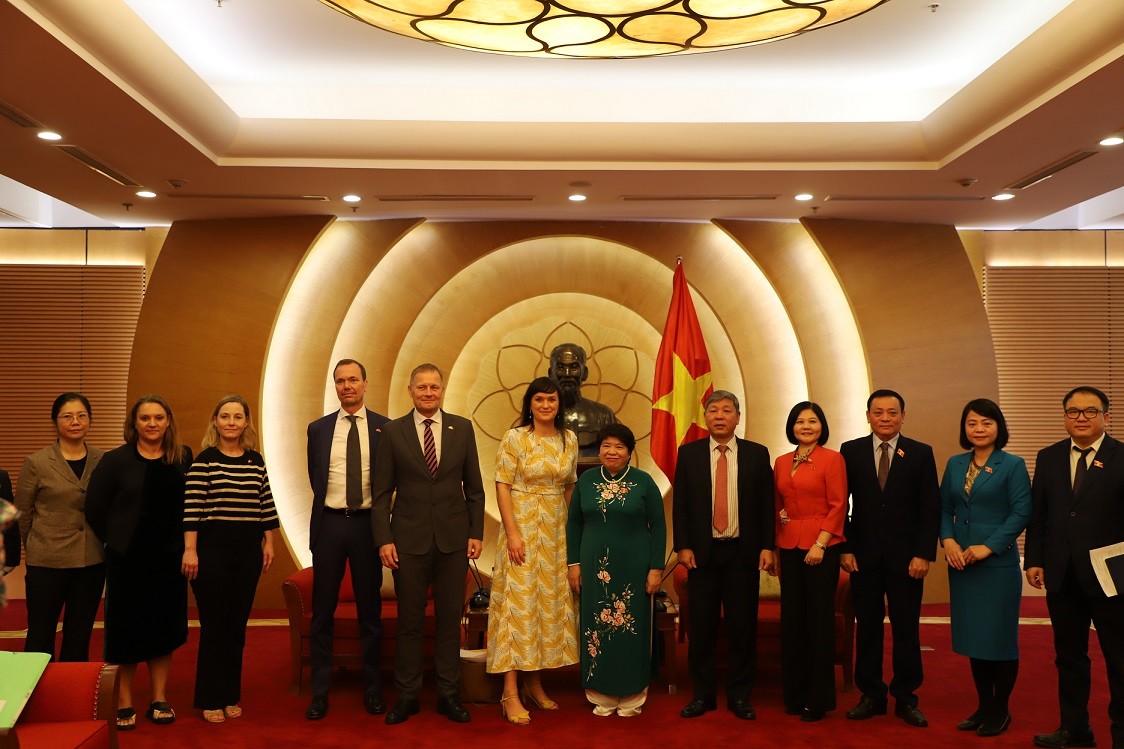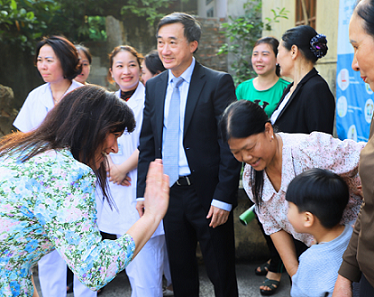
Vietnam-Denmark Green Strategic Partnership delivers high-level dialogue on health
Latest
 |
| The Danish Minister for Interior and Health had a meeting with the Chairperson of the Social Affairs Committee of the National Assembly, H.E. Ms. Nguyen Thuy Anh. (Photo: Embassy of Denmark) |
The aim of the visit is to further strengthen the bilateral health cooperation, especially on primary health care and non-communicable diseases.
Ms. Sophie Løhde’s visit is the first Danish high-level visit to Vietnam after the signing of the Green Strategic Partnership (GSP) last November, in which Vietnam and Denmark reaffirm mutual commitment to the continued cooperation in the health sector, one of five bilateral Strategic Sector Cooperation programs.
Vietnam is in a transition where socio-economic development, urbanization and an ageing population are changing the disease patterns and increasing the demand for health services. As an indication of this shift, Vietnam has experienced an increase of non-communicable diseases from 46% of the disease burden in 1990, to 74% in 2017.
Many Vietnamese national indicators, especially in communicable diseases, malnutrition and infant and maternal health, show impressive progress and improvements, demonstrating that Vietnam has done extremely well in translating economic growth into concrete benefits for its citizens, enhancing both social and human development. National averages, however, still mask inequities – in particular for ethnic minorities, and other disadvantaged groups who do not have equitable access to health care services.
Non-communicable diseases are a big challenge in both Denmark and Vietnam, where the diseases tend to disproportionately affect low-income individuals and families. In both Denmark and Vietnam, an effective response to non-communicable diseases stems from a strong primary healthcare sector that can make information, guidance, treatment and support accessible to all.
In Vietnam, the new Directive 25/CT-TW, issued by the Party Central Committee’s Secretariat on October 25 last year to further strengthen grassroots healthcare, is showing the strong commitment of the Vietnamese leadership to this approach.
The Strategic Sector Cooperation between Vietnamese health authorities and Danish health authorities started in 2016. The goal of the Strategic Sector Cooperation is to strengthen primary health care in Vietnam for prevention, detection and treatment management of non-communicable diseases through policy dialogue, technical exchanges and training. The Strategic Sector Cooperation includes activities at policy level with the Ministry of Health as well as the local level, including the Department of Health and 30 commune health stations in Thai Binh province.
In addition to the Strategic Sector Cooperation, Denmark supports Vietnam through the Danida Fellowship Center (DFC) training courses and joint research projects, promoting the transfer of knowledge, expertise and experiences between health-workers and experts of the two countries. Currently, the Vietnamese DFC alumni in health has more than 120 people, who have studied in Denmark for either short courses, master degrees or PhDs.
 |
| The Danish Minister for the Interior and Health visited Thai Binh, where training activities and joint research are being carried out. (Photo: Embassy of Denmark) |
At the meeting with Vietnamese Deputy Minister of Health Tran Van Thuan, the Danish Minister said “Our cooperation in health is based on a common understanding that primary health care is crucial in ensuring equal access to health and tackling the growing burden of non-communicable diseases. I hope that our cooperation can serve as inspiration for the development of a strong Vietnamese model for ensuring equal access to basic healthcare, reducing out-of-pocket spending and helping patients live their lives to the fullest despite diseases”.
During her visit in Vietnam, the Danish Minister for Interior and Health had a meeting with the Chairperson of the Social Affairs Committee of the National Assembly Nguyen Thuy Anh in which they together explored opportunities to strengthen Vietnam’s primary healthcare system and discussed how to enhance equal access to health services for disadvantaged communities in Vietnam.
The Minister also visited Thai Binh, where training activities and joint research are being carried out.
Before the ending of her visit, the Minister will engage with Vietnamese partners in efforts to curb anti-microbial resistance, a killer of more than 1.3 million people globally in 2019, during a visit to the National Institute of Hygiene and Epidemiology.
Phase three of the cooperation, which consolidates the results gained during phase one and two and further advances the cooperation in primary health care and non-communicable diseases, is expected to commence later this year.













